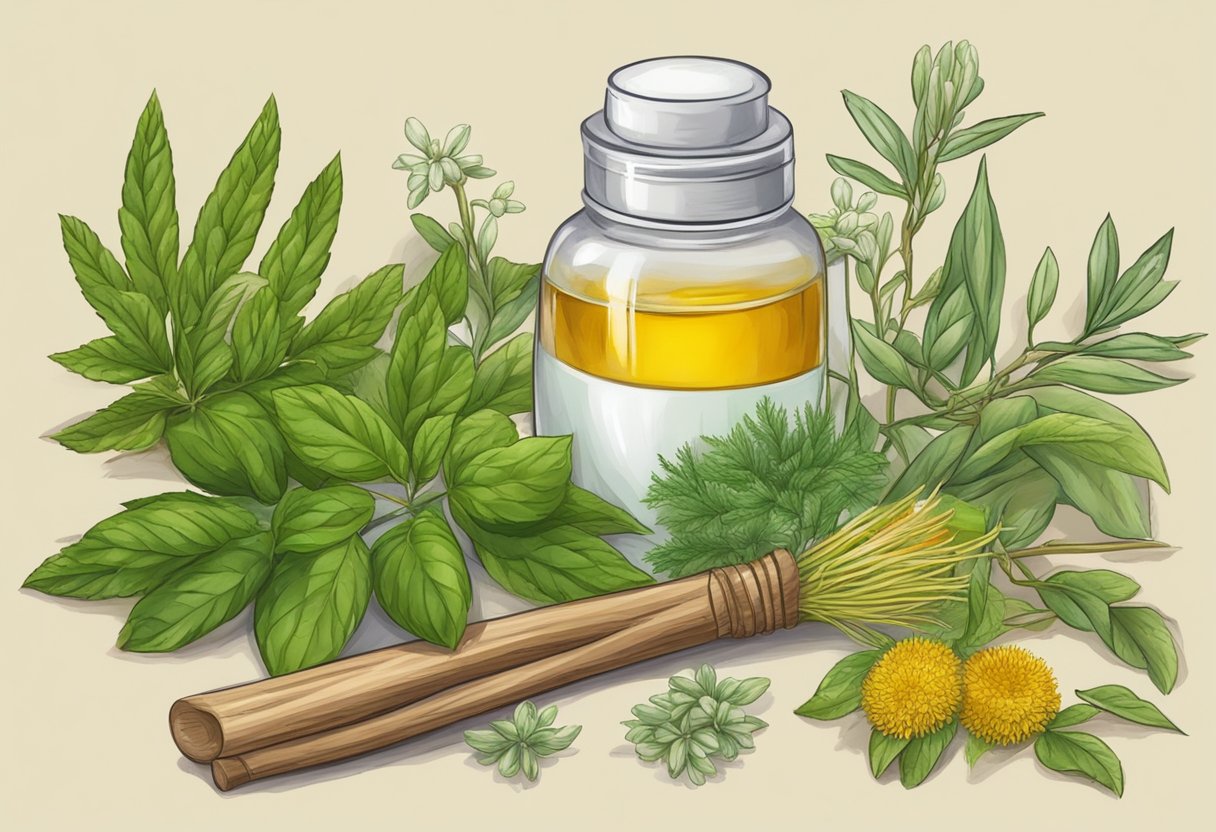Herbal Remedies for Mastitis~ Mastitis is a condition that affects many lactating women, and it can be painful and uncomfortable. While there are medical treatments available, some women prefer to use natural remedies to alleviate the symptoms. One such remedy is the use of herbs, which have been used for centuries to treat a variety of ailments.
Disclaimer: This article is provided for informational purposes only and should not replace professional medical advice. Please consult with a qualified healthcare practitioner or herbalist before using any herbal remedies.

Herbal medicine is a popular alternative to traditional medicine, and it is believed that herbs can help to reduce inflammation and pain associated with mastitis. There are a variety of herbs that can be used to treat mastitis, including chamomile, garlic, and calendula. These herbs can be taken orally or applied topically, and they are believed to have anti-inflammatory and antibacterial properties that can help to reduce swelling and pain.
Overall, using herbs to treat mastitis can be a safe and effective way to alleviate the symptoms of this condition. However, it is important to consult with a healthcare professional before using any herbal remedies, as some herbs can interact with medications or cause allergic reactions. Additionally, it is important to follow proper self-care techniques, such as maintaining good hygiene and applying warm compresses, to help prevent the development of mastitis.
Key Takeaways
- Herbal remedies can be an effective way to alleviate the symptoms of mastitis.
- It is important to consult with a healthcare professional before using any herbal remedies.
- Proper self-care techniques can help to prevent the development of mastitis.
Understanding Mastitis~ Herbal Remedies for Mastitis
Mastitis is a common and often painful condition that affects lactating mammals, including cows, goats, and humans. It is an inflammation of the mammary gland that can be caused by various factors, including bacterial infections, physical damage, and hormonal imbalances.

Symptoms of Mastitis
The symptoms of mastitis can vary depending on the severity of the infection. Some common signs include:
- Swelling, redness, and warmth in the affected breast
- Pain or tenderness in the breast
- A burning sensation or itching in the breast
- Fever or flu-like symptoms, such as chills and fatigue
Mastitis Infection
Mastitis is usually caused by a bacterial infection, which can enter the breast through a cracked or sore nipple. The most common bacteria that cause mastitis are Staphylococcus aureus and Streptococcus agalactiae. These bacteria are normally present on the skin and in the mouth and nose of healthy individuals.
Lactation Mastitis
Lactation mastitis is a type of mastitis that occurs during breastfeeding. It is usually caused by a buildup of milk in the breast, which can lead to inflammation and infection. Lactation mastitis is more common in women who are breastfeeding for the first time, have a history of breast infections, or have a weak immune system.
Inflammation of the Breast
Inflammation of the breast can occur for various reasons, including injury, surgery, and hormonal changes. However, mastitis is a specific type of breast inflammation that is caused by an infection.
Subclinical Mastitis
Subclinical mastitis is a type of mastitis that does not cause any visible symptoms. It is usually detected through a milk test, which can identify the presence of bacteria or other abnormalities in the milk. Subclinical mastitis can be a concern for dairy farmers, as it can lead to a decrease in milk production and quality.
Mastitis Diagnosis
Mastitis can be diagnosed through a physical examination of the breast and a milk test. A doctor or veterinarian may also perform a blood test to check for signs of infection. In some cases, imaging tests, such as a mammogram or ultrasound, may be necessary to rule out other conditions.
Understanding the symptoms, causes, and types of mastitis is essential for proper diagnosis and treatment. With early detection and appropriate care, mastitis can be effectively managed and prevented from becoming a chronic condition.

Causes of Mastitis~ Herbal Remedies for Mastitis
Mastitis is a common and painful condition that affects lactating individuals. The condition occurs when the breast tissue becomes inflamed, usually due to an infection. The most common cause of mastitis is bacteria entering the breast through a cracked or sore nipple. Other causes of mastitis may include:
- Poor latch: When the baby does not latch onto the breast properly, it can cause milk to build up in the breast, leading to clogged milk ducts and eventually mastitis.
- Clogged milk ducts: Milk ducts can become clogged when milk is not properly drained from the breast. This can occur if the baby is not nursing enough or if there is a blockage in the milk duct.
- Plugged milk ducts: Similar to clogged milk ducts, plugged milk ducts can occur when milk is not properly drained from the breast. This can happen if the baby is not nursing enough or if there is pressure on the breast.
- Blood stagnation: In Traditional Chinese Medicine, mastitis is thought to be caused by blood stagnation in the breast. This can occur due to a variety of factors, including stress, poor diet, and lack of exercise.
While mastitis can be a painful and uncomfortable condition, it is usually treatable with antibiotics and home remedies. It is important to seek medical attention if symptoms persist or worsen.
Recognizing the Symptoms~ Herbal Remedies for Mastitis
Mastitis is a condition that affects the mammary gland, usually in lactating women. It is essential to recognize the symptoms of mastitis early to prevent the condition from worsening. Here are some of the most common symptoms of mastitis:
- Affected Breast: Mastitis usually affects one breast, and the affected breast may be swollen, red, and warm to the touch. In some cases, the breast may feel hard and lumpy.
- Sore Breast: Mastitis can cause breast pain, which can range from mild to severe. The pain may be localized or spread across the entire breast.
- Sore Nipples: Mastitis can also cause sore nipples, which may be cracked or bleeding. The nipple may be painful to the touch.
- High Fever: Mastitis can cause a high fever, usually above 101°F (38.3°C). The fever may come on suddenly and may be accompanied by chills.
- Body Aches: Mastitis can cause body aches, which may be mild or severe. The aches may be localized or spread across the entire body.
- Flu-like Symptoms: Mastitis can cause flu-like symptoms, such as fatigue, headache, and nausea. These symptoms may come on suddenly and may be accompanied by a high fever.
It is important to recognize the first signs of mastitis and seek medical attention as soon as possible. Early treatment can help prevent the condition from worsening and may help reduce the risk of complications.

Consulting a Health Professional~ Herbal Remedies for Mastitis
If an individual suspects they have mastitis, they should consult a health professional such as their primary care physician, lactation consultant, or another appropriate health care provider. It’s important to seek medical treatment as soon as possible to prevent the infection from worsening.
During a consultation, the health professional may perform a physical examination and ask about the individual’s symptoms. They may also recommend antibiotic treatment, which is often the most effective way to treat mastitis. It’s important to follow the prescribed antibiotic therapy as directed and to complete the full course of treatment to ensure the infection is fully eradicated.
In some cases, a broad-spectrum antibiotic may be prescribed. This type of antibiotic is effective against a wide range of bacteria and may be used if the specific bacteria causing the infection is unknown. However, it’s important to note that overuse of antibiotics can lead to antibiotic resistance, so it’s important to only use antibiotics when necessary and as directed by a health professional.
In addition to antibiotics, the health professional may recommend other treatments such as pain relievers or warm compresses to alleviate symptoms. They may also recommend herbal remedies, such as a combination of herbs that have been shown to be effective in treating mastitis. However, it’s important to consult with a health professional before using any herbal remedies to ensure they are safe and effective.
Overall, consulting a health professional is essential for proper diagnosis and treatment of mastitis. They can provide medical treatment, recommend appropriate antibiotics, and offer guidance on other treatments such as herbal remedies.
Natural Remedies for Mastitis~ Herbal Remedies for Mastitis
Mastitis is a common condition that affects lactating women. It is an inflammation of the breast tissue that can cause pain, swelling, and redness. While antibiotics are often used to treat mastitis, some women prefer to use natural remedies instead.
Herbal Treatment
Herbal remedies have been used for centuries to treat a variety of ailments, including mastitis. Some herbs that are commonly used to treat mastitis include:
- Echinacea: This herb is known for its immune-boosting properties and may help reduce inflammation.
- Dandelion: Dandelion has been used to treat breast inflammation for centuries. It is believed to help reduce swelling and pain.
- Thyme: Thyme has antibacterial properties and may help fight off infection.
Herbs can be taken in a variety of forms, including teas, tinctures, and capsules. It is important to speak with a healthcare provider before using any herbal remedies, as some herbs can interact with medications or have side effects.
Warm Compress

A warm compress can help relieve pain and reduce swelling associated with mastitis. To make a warm compress, soak a clean cloth in warm water and apply it to the affected breast for 15-20 minutes at a time. Repeat several times a day.
Raw Garlic
Garlic has antibacterial properties and may help fight off infection. Some women find that eating raw garlic or taking garlic supplements can help relieve symptoms of mastitis.
Vitamin C
Vitamin C is an antioxidant that can help boost the immune system. Some women find that taking vitamin C supplements or eating foods high in vitamin C, such as citrus fruits and leafy greens, can help prevent mastitis.
Coconut Oil
Coconut oil has antibacterial properties and may help fight off infection. Some women find that applying coconut oil to the affected breast can help relieve symptoms of mastitis.
Apple Cider Vinegar
Apple cider vinegar has antibacterial properties and may help fight off infection. Some women find that adding a tablespoon of apple cider vinegar to a glass of water and drinking it several times a day can help relieve symptoms of mastitis.
While natural remedies can be effective for some women, it is important to speak with a healthcare provider before using any natural remedies to treat mastitis. In some cases, antibiotics may be necessary to treat an infection.
Herbal Medicines and Chinese Medicine~ Herbal Remedies for Mastitis
Mastitis, a common condition among lactating women, can be treated using herbal medicines and Chinese medicine. These natural remedies have been used for centuries to alleviate symptoms and promote healing.
Chinese medicine, in particular, has a long history of using herbs to treat mastitis. Jin Yin Hua, also known as honeysuckle flower, is a popular herb used in Chinese medicine to reduce inflammation and pain. Angelica roots, also known as dang gui, are another commonly used herb that can help promote blood circulation and reduce swelling.
Nettle leaf is another herb that can be used to treat mastitis. It has anti-inflammatory properties that can help reduce pain and swelling. Raspberry leaf is another herb that can help reduce inflammation and promote healing.
In addition to herbs, poultices made from fenugreek seeds can also be used to treat mastitis. Fenugreek seeds contain compounds that can help reduce inflammation and promote healing. A fenugreek seed poultice can be applied directly to the affected area to help reduce pain and swelling.
Chinese herbal formulae, which are combinations of several herbs, are also used to treat mastitis. These formulae are customized based on the individual’s symptoms and constitution. The ten most commonly prescribed Chinese herbal formulae for mastitis include Gualou Niubang Decoction, which has been shown to be effective in treating plasma cell mastitis.
Overall, herbal medicines and Chinese medicine can be effective in treating mastitis. However, it is important to consult with a qualified practitioner before using any herbal remedies to ensure their safety and efficacy.
Self-Care Techniques~ Herbal Remedies for Mastitis
Self-care techniques can be effective in treating mastitis and relieving its symptoms. Here are some self-care techniques that can help:
Milk Production
To increase milk production, the mother should breastfeed frequently. The more milk the baby consumes, the more milk the mother will produce. If the baby is not feeding well, the mother can try pumping the breast milk to stimulate milk production.
Milk Flow
The mother should try to empty the breast completely during each feeding session. This will help to prevent milk from building up in the breast and causing mastitis.
Hot Shower
A hot shower can help to relieve the pain and discomfort associated with mastitis. The mother should stand under the hot water and allow it to run over the affected breast.
Warm Water
Applying warm water to the affected breast can also help to relieve pain and discomfort. The mother can use a hot water bottle or soak a cloth in warm water and apply it to the breast.
Cold Cabbage Leaf
Applying a cold cabbage leaf to the affected breast can help to reduce inflammation and relieve pain. The mother should place a chilled cabbage leaf on the breast and leave it there for 20 minutes.
Tea Bags
Tea bags can also be used to reduce inflammation and relieve pain. The mother can soak tea bags in warm water and apply them to the affected breast.
Lots of Water
Drinking lots of water can help to flush out toxins from the body and reduce inflammation. The mother should aim to drink at least eight glasses of water per day.
Small Circles
Massaging the affected breast in small circles can help to relieve pain and discomfort. The mother should use her fingertips to massage the breast gently.
In conclusion, self-care techniques can be effective in treating mastitis and relieving its symptoms. The mother should breastfeed frequently, empty the breast completely during each feeding session, and apply hot or warm water to the affected breast. She can also use cold cabbage leaves, tea bags, and massage to relieve pain and discomfort. Drinking lots of water can help to flush out toxins from the body and reduce inflammation.
Postpartum Considerations~ Herbal Remedies for Mastitis
Mastitis is a common issue that can occur in nursing mothers, especially in the early weeks postpartum. It is important for new mothers to be aware of the symptoms of mastitis and to take steps to prevent and treat it. In addition, there are several postpartum considerations that nursing mothers should keep in mind when using herbs to treat mastitis.
One important consideration is postpartum depression. Many new mothers experience postpartum depression, which can make it difficult to care for themselves and their babies. It is important for nursing mothers to be aware of the symptoms of postpartum depression and to seek help if they are experiencing it. Herbs can be a helpful tool for treating postpartum depression, but it is important to work with a healthcare provider to ensure that they are safe and effective.
Babys Age~ Herbal Remedies for Mastitis
Another consideration is the age of the baby. Nursing babies are more susceptible to infections, including mastitis. It is important for nursing mothers to be aware of the symptoms of mastitis and to take steps to prevent and treat it. Herbs can be a helpful tool for treating mastitis, but it is important to work with a healthcare provider to ensure that they are safe and effective for both the mother and the nursing baby.
When using herbs to treat mastitis, it is important to consider the timing of administration. Some herbs may be more effective if taken at specific times, such as before bed or first thing in the morning. It is important to follow the instructions provided by a healthcare provider or herbalist when using herbs to treat mastitis.
Finally, it is important to consider the baby’s position during nursing. The baby’s chin should be pressed against the breast, which can help to prevent mastitis. If the baby is not positioned properly, it can lead to engorgement and mastitis. Nursing mothers should work with a lactation consultant to ensure that the baby is positioned properly during nursing.
In summary, there are several postpartum considerations that nursing mothers should keep in mind when using herbs to treat mastitis. These include postpartum depression, the age of the baby, the timing of administration, and the baby’s position during nursing. It is important for nursing mothers to work with a healthcare provider or herbalist to ensure that they are using herbs safely and effectively.
Preventing Mastitis~ Herbal Remedies for Mastitis
Mastitis is a common and painful condition that can affect lactating women. Fortunately, there are several ways to prevent mastitis from occurring. By taking good care of the breast tissue and milk ducts, women can reduce their risk of developing mastitis.
One of the most important things women can do to prevent mastitis is to maintain a healthy immune system. The immune system helps to fight off infections and inflammation, which are two common causes of mastitis. Women can boost their immune system by eating a healthy diet, getting enough sleep, and staying hydrated.
Common Causes~ Herbal Remedies for Mastitis
Breast engorgement is another common cause of mastitis. This occurs when the breast tissue becomes swollen and painful due to a buildup of milk. To prevent engorgement, women should try to nurse or pump frequently, especially in the first few weeks after giving birth.
Good blood circulation is also important for preventing mastitis. Women can improve blood circulation by staying active and doing exercises that target the chest and back muscles.
Urinary tract infections can also increase the risk of developing mastitis. To prevent UTIs, women should practice good hygiene, avoid using irritating products, and drink plenty of water.
Using herbal remedies is another good idea for preventing mastitis. Certain herbs have anti-inflammatory and antimicrobial properties that can help to keep the breast tissue healthy. Women can find these herbs at health food stores or online. It is important to understand the cause of mastitis before using any herbal remedies.
Dosage Consideration~ Herbal Remedies for Mastitis
When using herbs for mastitis prevention, it is important to follow the suggested dosage. Taking too much of an herb can be harmful to the body. Women should also be aware of any potential side effects or interactions with other medications.
In summary, preventing mastitis involves taking good care of the breast tissue, maintaining a healthy immune system, and using herbal remedies when appropriate. By following these tips, women can reduce their risk of developing mastitis and enjoy a comfortable breastfeeding experience.







3 Comments on “Natural Herbal Remedies for Mastitis”